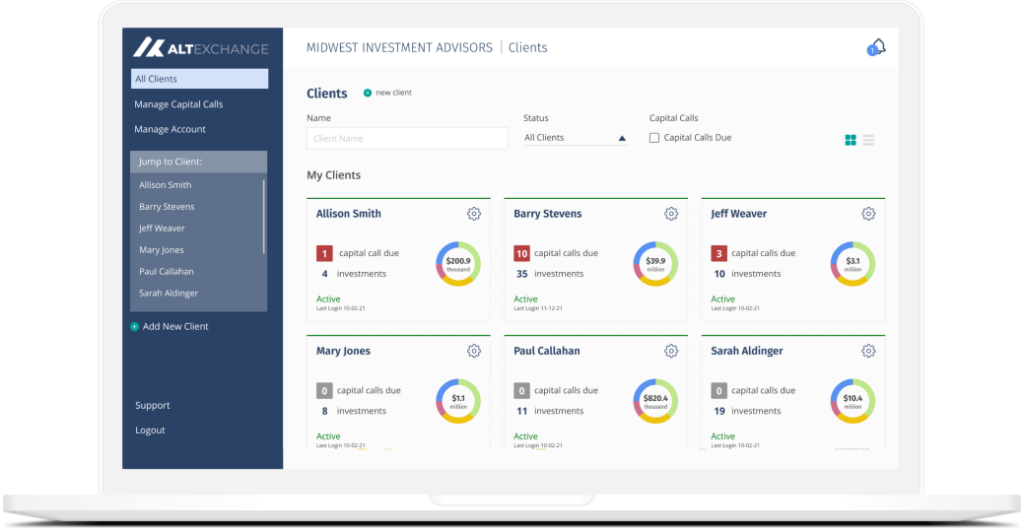As financial advisors, ensuring your clients’ financial portfolios are diversified and secure is essential. In this day and age, alternative investments such as cryptocurrencies, venture capital funds, private equity, real estate investment trusts (REITs), hedge funds and commodities can play an important role in a well-balanced portfolio. By incorporating alternative investments into your client’s financial plan you can help them achieve their financial goals while mitigating the risk of volatility associated with traditional markets.
If you’re an advisor looking to further diversify your clients’ portfolios, here’s everything you need to know about alternative investments.

Why invest in alternatives?
Alternative investments can provide financial advisors and their clients with a number of unique benefits. Portfolio diversification is one of the most important advantages to investing in alternative assets. Diversifying a financial portfolio is an essential part of managing financial risks and gaining financial rewards. By investing in different types of assets, you can reduce the overall risk associated with any one asset class and benefit from the upside of different investment opportunities.
Additionally, by introducing non-correlated investments into a financial plan, investors can potentially reduce the overall volatility of a portfolio and minimize risk over time. This is because alternatives, especially illiquid alts, are less-correlated to the public markets. When the stock market experiences volatility or downturns, your clients can be secure knowing their entire portfolio will not experience the same effects.

While alternative investments do come with risks and can be more complex in nature, there is a reason why ultra-high-net-worth individuals allocate more than 50% of their portfolio to alternatives. Alternatives, in some cases, can offer higher return potential than traditional investments. For example, private equity investments have outperformed the S&P 500 for the last decade.
Overall, offering your clients exposure to alternatives can provide even further portfolio diversification to protect against stock market volatility, in addition to the potential for higher returns.
Becoming a leading advisor in alternatives
There are a few ways to go about incorporating alternatives into your advisory practice. There are two main strategies: 1) Offer exposure to alternative investment opportunities, and 2) managing your clients’ existing portfolio of alternatives.
First, let’s discuss offering alternative investment opportunities for your clients. If you’re ready to get started providing exposure to investments, there are plenty of ways to do so. Online platforms such as CrowdStreet, Juniper Square, AcreTrader, and Fundrise, for example, all make it possible to invest in alternatives entirely online. In addition, you can find a variety of deals from trusted independent asset managers. And if you’re looking to start smaller, simply offering exposure to real estate investment trusts (REITs) is an option as well.

The next strategy though is even simpler, yet many advisors are overlooking it. There’s a good chance your clients are already investing in alternatives, whether you know it or not. In fact, 80% of young, wealthy investors are allocated to alternatives. And many clients are looking for a more holistic portfolio management experience from their trusted advisors. Offering visibility into your clients’ existing alts and incorporating them into your overall financial planning strategy for your clients is a great way to upgrade your services as a financial advisor. Read more for how to get started managing your clients’ alternatives.
Getting started managing your clients’ alternative investments
Of course, as alternatives are often more complex in nature than their traditional counterparts, managing them can come with greater complexities as well. Most advisors who are currently managing alts for their clients are doing so via manual spreadsheets. Unfortunately, this is completely unsustainable for a breadth of client alts portfolios.
Luckily, technology is making it easier than ever for advisors to be able to manage their clients’ alts. AltExchange digitizes the alternative investment space and completely automates the process for advisors and their clients, making aggregating, reporting, and managing alts as easy as stocks.

Through AltExchange, advisors can track all alternatives in one portal, offer comprehensive performance reporting on new and existing investments, manage distributions, automate tax document collection, bill on alts, and export to their existing wealth management systems, all in one technology-powered solution. No more manual spreadsheets needed for tracking alts.
If you’re an advisor or investor in alts looking for the simplest solution to manage alternative investments, please reach out. We’d love to discuss how you can better streamline alternatives and spend more time on what matters most.